
The Southeast Asia Freedom of Expression Network (SAFEnet) – an institution concerned with freedom of expression in the digital world – has criticised Indonesia’s newly established virtual police (VP) unit formed under the national police headquarters that is tasked with monitoring the activities of netizens.
The programme, the brainchild of Indonesian police chief General Listyo Sigit Prabowo, was formed to prevent indictments under the Information and Electronic Transaction Law (UU ITE).
SAFEnet executive director Damar Juniarto is concerned however that instead of providing a sense of security the virtual police would in fact give rise to new fears.
The reason being that virtual police officers would intrude too far into the private lives of citizens in the digital sphere.
“This will instead give rise to new fears, where the police can appear at any time in citizen’s private [digital] space,” said Juniarto when contacted by CNN Indonesia last week.
Juniarto said that it was if the virtual police were reviving an Orwellian state. The term Orwellian state refers to a system and public situation that is anti-freedom and anti-openness and is taken from a fictional work by author and journalist George Orwell.
One of the criteria for an Orwellian state is when the state continuously monitors what is being done by its citizens.
‘Correcting’ citizens
In such a situation, continued Juniarto, the state can directly correct citizens who are deemed to be in error. Instead of feeling protected, people will in fact feel threatened and fearful.
“Even without this direct police presence, people are already afraid of the threat of the UU ITE [being used against them], never mind with methods such as this,” he said.
Not only that, Juniarto emphasised that the virtual police negate the space for people to defend themselves if a posting on the internet is deemed to be hate speech or violate the ITE Law.
The virtual police, according to Juniarto, would in fact negate the judicial process so people would only have one option – to obey or be punished.
Juniarto revealed that the virtual police’s presence have already turned people’s discussions in digital space into something has to be treated or cured. He is also concerned that they would destroy the climate of discussion and debate on digital media.
“So the VP needs to be corrected so their implementation prioritises education, not appearing as a figure which wants to punish disobedient citizens,” said Juniarto.
Earlier this week, the police officially launched the virtual police unit to monitor potential violations of the ITE Law on the internet.
Healthy cyber world
According to national police spokesperson Inspector General Argo Yuwono, the virtual police’s presence in digital space is a form of maintaining security and public order so that activities in the cyber world can be clean, healthy and productive.
“Through the virtual police, the police will provide education and notifications if what is written is a criminal violation, request that it not be written again and be deleted,” Yuwono told journalists.
According to Yuwono, the virtual police had already sent warnings to three accounts recently. One of the accounts had posted a picture with the caption “Don’t forget I’m a thief”.
“Virtual police alert. Warning 1. The content on your Twitter account uploaded on February 21, 2021, at 3.15 pm local time has the potential to be criminal hate speech.
“In order to avoid further legal proceedings you are asked to make a correction to the social media content after you have received this message. Salam Presisi [predictability, responsibility, transparency, justice],” said Yuwono reading out the contents of the warning.
Translated by James Balowski for IndoLeft News. The original title of the article was “SAFEnet Kritik Aksi Virtual Police Terobos Ruang Privat Warga”.











































